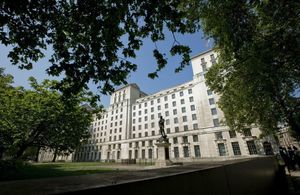Foreign Secretary announces critical practical support for Ukraine as winter sets in
- The Foreign Secretary has travelled to Ukraine to underline the UK’s unwavering support for the country following devastating Russian attacks on critical national infrastructure
- During the visit he has announced a further £3m of support to the Partnership Fund for a Resilient Ukraine to rebuild vital local infrastructure
- Comes as he and the Environment Secretary Thérèse Coffey announce that the UK is also committing £5 million for Ukraine-led initiative to ship grain to countries at risk of famine.
The Foreign Secretary has travelled to Ukraine as part of ongoing UK efforts to ensure the country has the crucial practical support it needs through the winter.
The visit comes as Russia tries to exploit the harsh winter in Ukraine by continuing its brutal attacks on the country’s civilian and energy infrastructure to exacerbate the ongoing humanitarian crisis.
During a visit to Kyiv on Saturday, the Prime Minister announced a £50 million package of defensive military support, and the Foreign Secretary will use this visit to ensure that the UK is following through on other key commitments, including further support to help Ukraine through the winter, and to rebuild and recover in the longer term.
That includes providing an additional 35 emergency vehicles, including 24 ambulances and 6 armoured vehicles, which are to arrive in Ukraine from the UK, to support civilians caught in conflict. He will also announce that the UK will step up its support on demining, increasing its support from £2m this year.
While in Ukraine, the Foreign Secretary will meet President Zelenskyy, as well as Foreign Minister Dmytro Kuleba, and other key members of the Ukrainian government, including ministers involved in reconstruction efforts. He is also meeting members of civil society who are fighting to protect human rights, and the UK’s embassy staff in Ukraine.
Foreign Secretary James Cleverly said:
As winter sets in, Russia is continuing to try and break Ukrainian resolve through its brutal attacks on civilians, hospitals and energy infrastructure. Russia will fail.
“The UK stands shoulder to shoulder with Ukraine. I have today announced a package of hands-on support for our Ukrainian friends in their fight, from ambulances to crucial support for survivors of the sexual violence carried out by the Russian military.
I’ve seen here first-hand how the UK’s efforts are helping brave citizens to resist and rebuild. Our support will continue for as long as it takes for this remarkable country to recover.
During the visit the Foreign Secretary has seen the scale of catastrophe wrought indiscriminately by Putin, and how the UK – with its international partners – is providing concrete support for recovery.
Through this fund the UK is supporting the Government of Ukraine, local officials and Ukrainian communities to rebuild vital local infrastructure. This is enabling people to return to normal life by clearing debris from Russian attacks, making areas safe and secure, and rebuilding schools and shelters in towns and villages. This new funding will be targeted to areas recently liberated from Russian control in southern Ukraine, including Kherson Oblast.
He is also visiting a school, which will re-open for 350 students in the next fortnight after being rebuilt by volunteers, including parents and teachers, with UK support. The Foreign Secretary will also visit an emergency housing complex run by the International Organisation for Migration and supported jointly by the UK, Ukraine and international partners.
Ahead of the UK hosted PSVI (Preventing Sexual Violence in Conflict Initiative) conference next week, the Foreign Secretary will announce a further £3.45 million for the UN Population Fund to boost survivor centred gender-based violence and sexual and reproductive health services, and ensure continued access to expert support for survivors of sexual assault.
The consequences of Putin’s war in Ukraine are also being felt across the world, and impacting some of the world’s most vulnerable countries. Today the Foreign Secretary, alongside the Environment Secretary Thérèse Coffey also announced that the UK is committing £5 million to a Ukrainian led initiative, delivered through the UN World Food Programme, to supply grain to countries most at risk of famine, including Yemen and Sudan.
Environment Secretary Thérèse Coffey said:
I am pleased the UK government can support President Zelenskyy’s work to help Ukraine’s grain reach some of the poorest and most vulnerable nations in the world.
“Global food security is in all our interests – and helping Ukraine’s farmers and agricultural sector to continue producing and exporting food in these most difficult of circumstances is vital for that security.
I want Ukraine’s farmers to know that all British farmers stand shoulder to shoulder with you.
